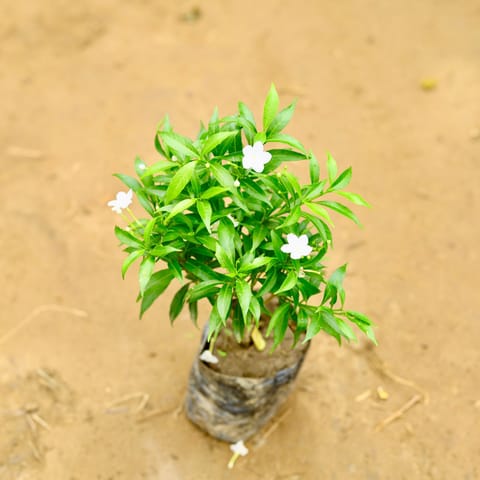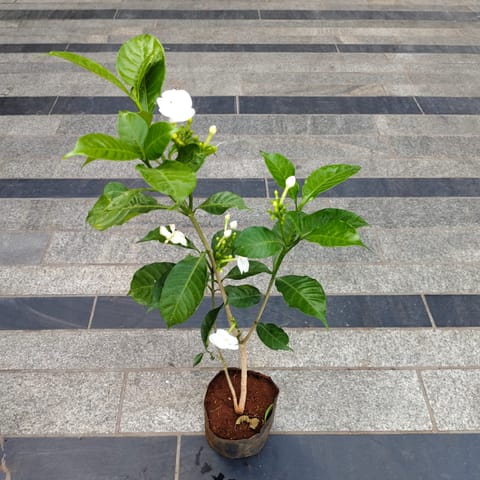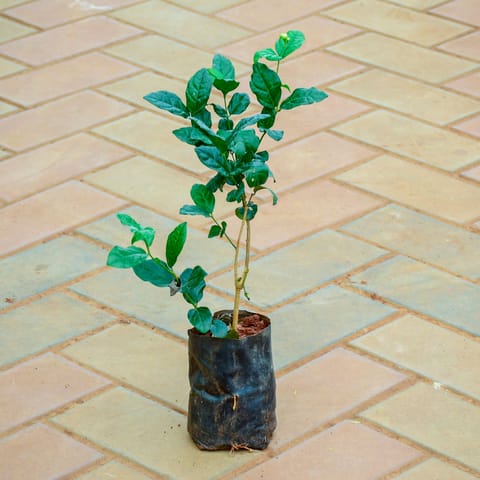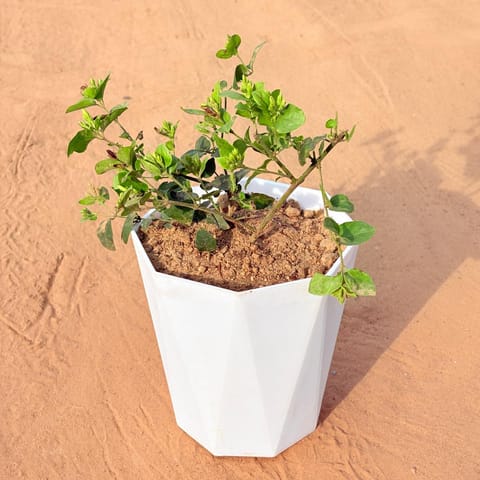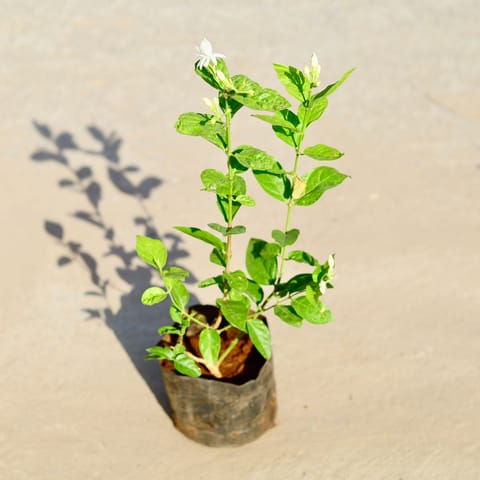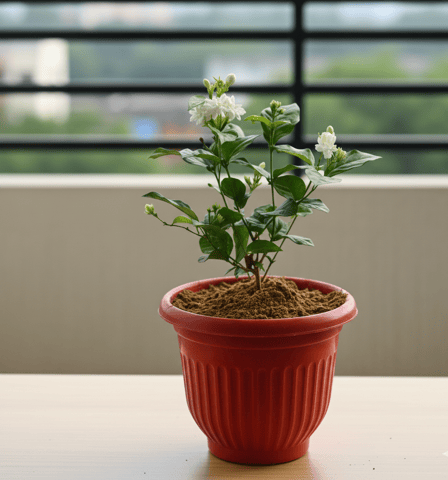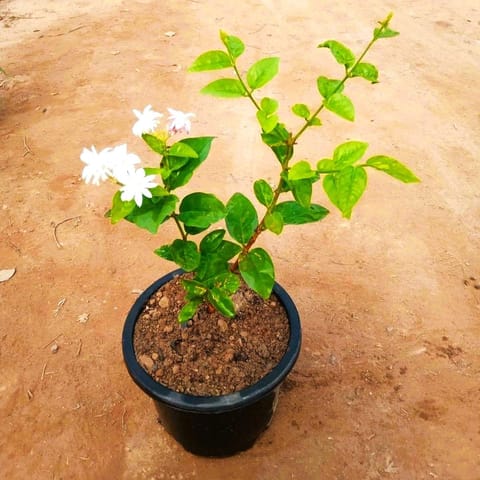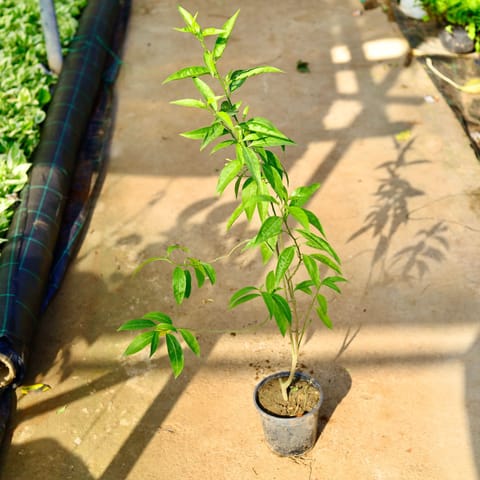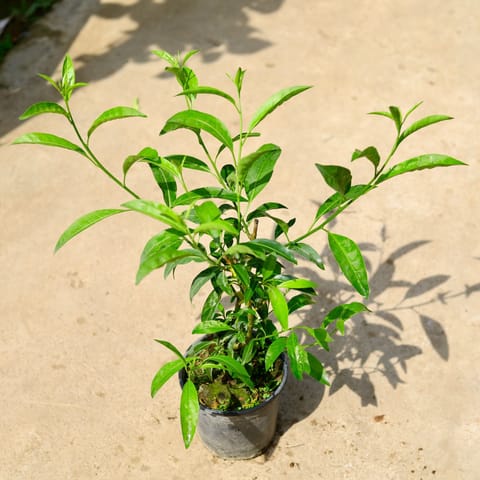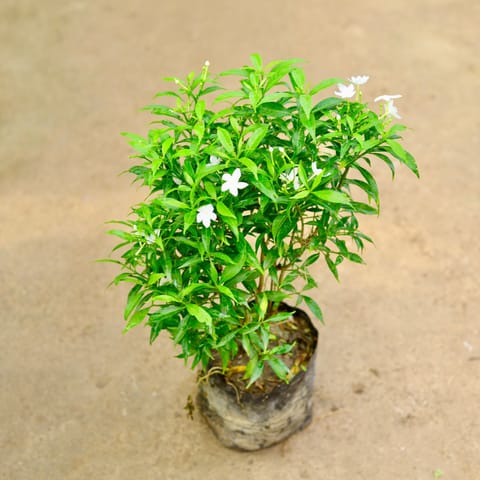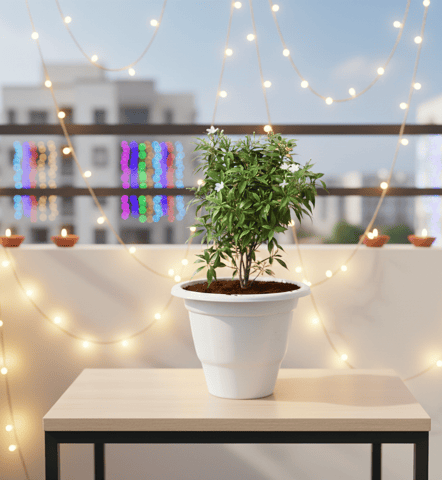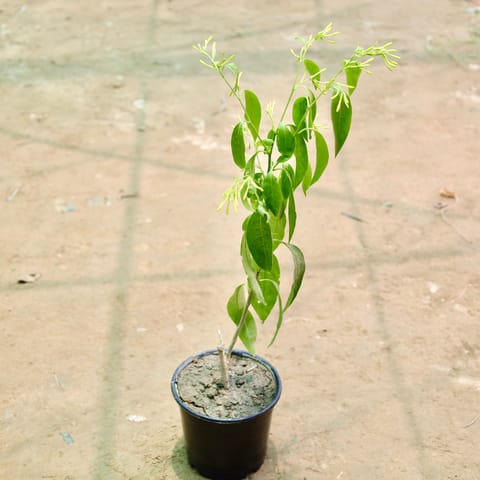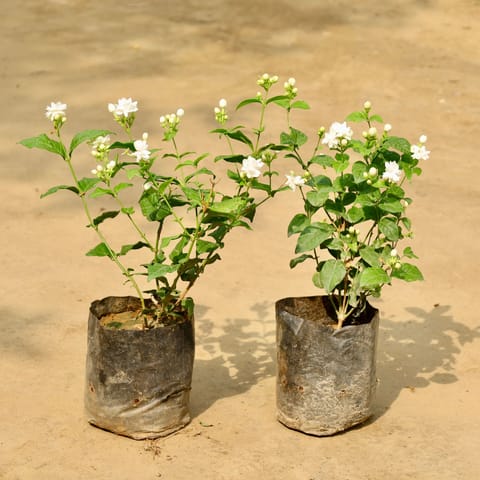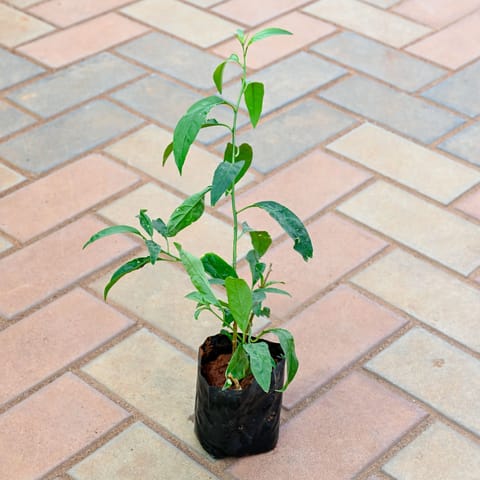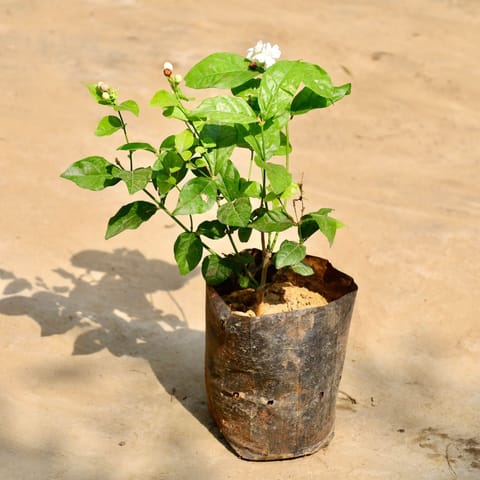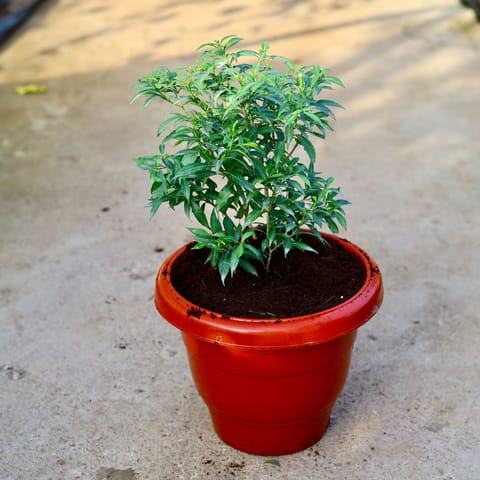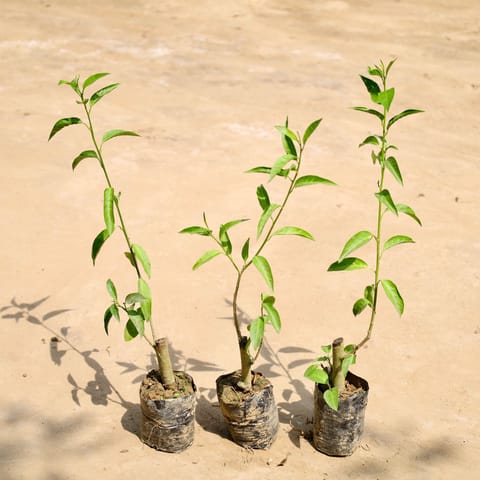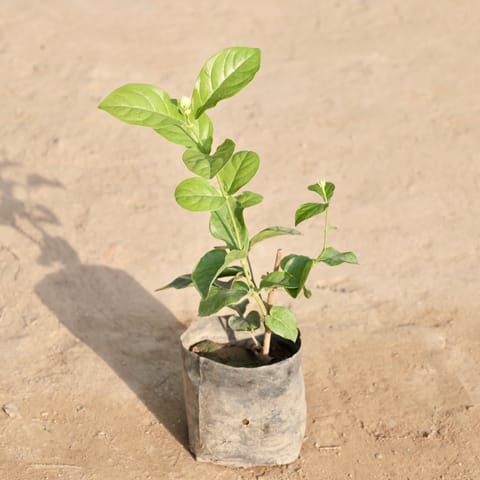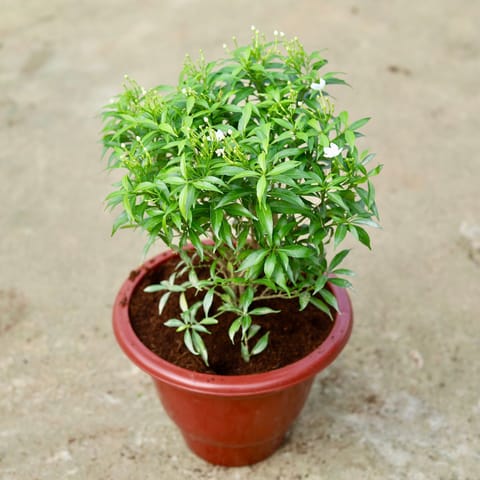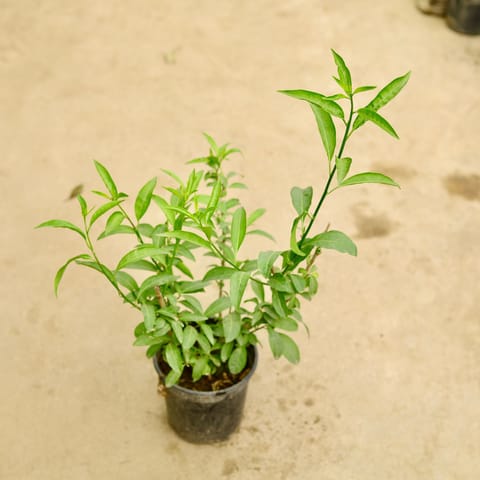Shop

Downalod our app
Search our catalog
Recent Search

Please provide your delivery pincode to see products available in your area
Recent Search
Are you sure you want to logout?
You will be logged out of your account
Your current session will end and you'll need to sign in again to access your account.
Jasmine Plant Collection
Uncover the enchanting world of jasmine flower plant varieties at Urvann, w...
Uncover the enchanting world of jasmine flower plant varieties at Urvann, where fragrance meets beauty in every bloom. Our carefully curated collection brings you the finest jasmine plants that will fill your home and garden with their signature sweet aroma. From the classic mogra to exotic star jasmine varieties, we offer healthy, live plants that are perfect for Indian growing conditions.
Jasmine plants are beloved across India for their intoxicating fragrance and delicate white flowers. These versatile plants can beautify balconies, terraces, and gardens whilst providing flowers for religious ceremonies and personal enjoyment. Our jasmine flower seeds and mature plants are sourced from trusted nurseries to ensure you receive only the best quality specimens for your space.
Popular Jasmine Plant Varieties Available at Urvann
Our extensive collection features the most sought-after jasmine varieties that thrive in Indian climates. Each variety offers its unique charm and growing characteristics, making it easy to find the perfect jasmine plant for your specific needs and preferences.
Jasminum Sambac (Arabian Jasmine)
Arabian Jasmine, commonly known as mogra in India, is the most beloved jasmine variety. This evergreen shrub produces intensely fragrant, pure white flowers that bloom throughout the year. The thick, waxy petals make it ideal for making garlands and using in religious ceremonies. Mogra plants are hardy and adapt well to both indoor and outdoor growing conditions.
Star Jasmine (Jasminum nitidum)
Star Jasmine captivates with its star-shaped, pristine white flowers that release a heavenly fragrance, particularly in the evenings. This climbing variety is perfect for covering walls, pergolas, and fences. The glossy, dark green foliage provides an excellent backdrop for the abundant blooms that appear from spring through autumn.
Juhi (Jasminum Auriculatum)
Juhi is a traditional Indian jasmine variety treasured for its small, delicate white flowers and sweet fragrance. This hardy climber produces clusters of tiny blooms that are commonly used in traditional Indian flower arrangements and religious offerings. Juhi plants are known for their resilience and ability to bloom profusely with minimal care.
Benefits of Growing Jasmine Plants
Growing jasmine plants in your home and garden offers numerous advantages beyond their obvious beauty and fragrance. These remarkable flowering plants serve multiple purposes whilst being relatively easy to maintain.
Jasmine plants naturally purify the air around them, making your living spaces healthier and more pleasant. The continuous blooming cycle ensures a steady supply of fresh flowers for your daily needs, be it for worship, decoration, or simply enjoying their natural perfume.
Natural Air Freshener
Jasmine flowers release their fragrance naturally, eliminating the need for artificial air fresheners. The sweet aroma helps create a calming atmosphere that promotes relaxation and reduces stress levels.
Religious and Cultural Significance
In Indian culture, jasmine flowers hold deep religious importance. Having your own jasmine plants ensures a fresh supply of flowers for daily prayers, festivals, and special occasions without depending on external sources.
Attracts Beneficial Insects
Jasmine flowers attract butterflies, bees, and other beneficial insects to your garden, supporting local biodiversity and helping with pollination of other plants in your space.
Low Maintenance Beauty
Once established, jasmine plants require minimal care whilst providing maximum visual and aromatic impact. They're perfect for busy individuals who want beautiful gardens without extensive maintenance commitments.
Care Tips for Jasmine Flowering Plants
Proper care ensures your jasmine flower plant thrives and produces abundant blooms throughout the growing season. Following these simple guidelines will help you maintain healthy, flowering jasmine plants.
Sunlight Requirements
Jasmine plants prefer bright, indirect sunlight for 4-6 hours daily. Morning sun with afternoon shade works excellently for most varieties.
Watering
Keep the soil consistently moist but not waterlogged. Water when the top inch of soil feels dry to touch. During monsoon season, reduce watering frequency to prevent root rot.
Soil Preparation
Use well-draining, fertile soil with good organic content. A mixture of garden soil, compost, and sand in equal proportions creates ideal growing conditions.
Fertilisation
Feed your jasmine plants with organic fertiliser every 4-6 weeks during the growing season. Bone meal and cow dung manure work exceptionally well for promoting healthy blooms.
Pruning
Regular pruning after the blooming cycle encourages new growth and more flowers. Remove dead, diseased, or weak branches to maintain plant health.
Pest Management
Keep an eye out for aphids and scale insects. Neem oil spray works effectively as a natural pest deterrent without harming the plants or beneficial insects.
Why Choose Urvann to Buy Jasmine Flowering Plants Online?
At Urvann, we understand the importance of quality when it comes to flowering plants. Our commitment to excellence ensures you receive the best jasmine plants that will thrive in your specific growing conditions.
Healthy, Live Flowers
Every jasmine plant in our collection is carefully inspected before dispatch. We guarantee healthy, disease-free plants with strong root systems that are ready to bloom in your garden.
Affordable Pricing
We believe beautiful gardens shouldn't cost a fortune. Our competitive pricing makes it possible for everyone to enjoy the luxury of fresh jasmine flowers at home without breaking the budget.
Wide Selection of Seasonal Plants
Beyond jasmine varieties, Urvann offers an extensive range of seasonal flowering plants, herbs, and garden accessories. You can create a complete garden ecosystem with plants that complement each other perfectly.
Doorstep Service
Our reliable delivery service brings your chosen jasmine plants directly to your doorstep, ensuring they arrive in perfect condition.
FAQ About Jasmine Plants
How long does it take for jasmine plants to start flowering?
Most jasmine plants begin flowering within 2-3 months of planting, provided they receive proper care and suitable growing conditions.
Can jasmine plants grow in pots indoors?
Yes, jasmine plants adapt well to container growing and can thrive indoors near bright windows. Choose compact varieties for better indoor success.
What is the best time to plant jasmine flower seeds?
The ideal time for planting jasmine flower seeds is during spring (February-April) when temperatures are moderate and conducive to germination.
How often should I water my jasmine plants?
Water jasmine plants when the top inch of soil feels dry, typically every 2-3 days during hot weather and less frequently during cooler months.
Do jasmine plants need special ceramic pots?
Whilst ceramic pots for plants provide excellent drainage and aesthetic appeal, jasmine plants can grow in any well-draining container. Ceramic planters and ceramic pots for indoor plants are popular choices for their durability and attractive appearance.
Are ceramic flower pots better than plastic ones for jasmine plants?
Ceramic pots for indoor plants offer better temperature regulation and drainage compared to plastic containers, making them excellent choices for healthy jasmine plant growth.
Uncover the enchanting world of jasmine flower plant varieties at Urvann, where fragrance meets beauty in every bloom. Our carefully curated collection brings you the finest jasmine plants that will fill your home and garden with their signature sweet aroma. From the classic mogra to exotic star jasmine varieties, we offer healthy, live plants that are perfect for Indian growing conditions.
Jasmine plants are beloved across India for their intoxicating fragrance and delicate white flowers. These versatile plants can beautify balconies, terraces, and gardens whilst providing flowers for religious ceremonies and personal enjoyment. Our jasmine flower seeds and mature plants are sourced from trusted nurseries to ensure you receive only the best quality specimens for your space.
Popular Jasmine Plant Varieties Available at Urvann
Our extensive collection features the most sought-after jasmine varieties that thrive in Indian climates. Each variety offers its unique charm and growing characteristics, making it easy to find the perfect jasmine plant for your specific needs and preferences.
Jasminum Sambac (Arabian Jasmine)
Arabian Jasmine, commonly known as mogra in India, is the most beloved jasmine variety. This evergreen shrub produces intensely fragrant, pure white flowers that bloom throughout the year. The thick, waxy petals make it ideal for making garlands and using in religious ceremonies. Mogra plants are hardy and adapt well to both indoor and outdoor growing conditions.
Star Jasmine (Jasminum nitidum)
Star Jasmine captivates with its star-shaped, pristine white flowers that release a heavenly fragrance, particularly in the evenings. This climbing variety is perfect for covering walls, pergolas, and fences. The glossy, dark green foliage provides an excellent backdrop for the abundant blooms that appear from spring through autumn.
Juhi (Jasminum Auriculatum)
Juhi is a traditional Indian jasmine variety treasured for its small, delicate white flowers and sweet fragrance. This hardy climber produces clusters of tiny blooms that are commonly used in traditional Indian flower arrangements and religious offerings. Juhi plants are known for their resilience and ability to bloom profusely with minimal care.
Benefits of Growing Jasmine Plants
Growing jasmine plants in your home and garden offers numerous advantages beyond their obvious beauty and fragrance. These remarkable flowering plants serve multiple purposes whilst being relatively easy to maintain.
Jasmine plants naturally purify the air around them, making your living spaces healthier and more pleasant. The continuous blooming cycle ensures a steady supply of fresh flowers for your daily needs, be it for worship, decoration, or simply enjoying their natural perfume.
Natural Air Freshener
Jasmine flowers release their fragrance naturally, eliminating the need for artificial air fresheners. The sweet aroma helps create a calming atmosphere that promotes relaxation and reduces stress levels.
Religious and Cultural Significance
In Indian culture, jasmine flowers hold deep religious importance. Having your own jasmine plants ensures a fresh supply of flowers for daily prayers, festivals, and special occasions without depending on external sources.
Attracts Beneficial Insects
Jasmine flowers attract butterflies, bees, and other beneficial insects to your garden, supporting local biodiversity and helping with pollination of other plants in your space.
Low Maintenance Beauty
Once established, jasmine plants require minimal care whilst providing maximum visual and aromatic impact. They're perfect for busy individuals who want beautiful gardens without extensive maintenance commitments.
Care Tips for Jasmine Flowering Plants
Proper care ensures your jasmine flower plant thrives and produces abundant blooms throughout the growing season. Following these simple guidelines will help you maintain healthy, flowering jasmine plants.
Sunlight Requirements
Jasmine plants prefer bright, indirect sunlight for 4-6 hours daily. Morning sun with afternoon shade works excellently for most varieties.
Watering
Keep the soil consistently moist but not waterlogged. Water when the top inch of soil feels dry to touch. During monsoon season, reduce watering frequency to prevent root rot.
Soil Preparation
Use well-draining, fertile soil with good organic content. A mixture of garden soil, compost, and sand in equal proportions creates ideal growing conditions.
Fertilisation
Feed your jasmine plants with organic fertiliser every 4-6 weeks during the growing season. Bone meal and cow dung manure work exceptionally well for promoting healthy blooms.
Pruning
Regular pruning after the blooming cycle encourages new growth and more flowers. Remove dead, diseased, or weak branches to maintain plant health.
Pest Management
Keep an eye out for aphids and scale insects. Neem oil spray works effectively as a natural pest deterrent without harming the plants or beneficial insects.
Why Choose Urvann to Buy Jasmine Flowering Plants Online?
At Urvann, we understand the importance of quality when it comes to flowering plants. Our commitment to excellence ensures you receive the best jasmine plants that will thrive in your specific growing conditions.
Healthy, Live Flowers
Every jasmine plant in our collection is carefully inspected before dispatch. We guarantee healthy, disease-free plants with strong root systems that are ready to bloom in your garden.
Affordable Pricing
We believe beautiful gardens shouldn't cost a fortune. Our competitive pricing makes it possible for everyone to enjoy the luxury of fresh jasmine flowers at home without breaking the budget.
Wide Selection of Seasonal Plants
Beyond jasmine varieties, Urvann offers an extensive range of seasonal flowering plants, herbs, and garden accessories. You can create a complete garden ecosystem with plants that complement each other perfectly.
Doorstep Service
Our reliable delivery service brings your chosen jasmine plants directly to your doorstep, ensuring they arrive in perfect condition.
FAQ About Jasmine Plants
How long does it take for jasmine plants to start flowering?
Most jasmine plants begin flowering within 2-3 months of planting, provided they receive proper care and suitable growing conditions.
Can jasmine plants grow in pots indoors?
Yes, jasmine plants adapt well to container growing and can thrive indoors near bright windows. Choose compact varieties for better indoor success.
What is the best time to plant jasmine flower seeds?
The ideal time for planting jasmine flower seeds is during spring (February-April) when temperatures are moderate and conducive to germination.
How often should I water my jasmine plants?
Water jasmine plants when the top inch of soil feels dry, typically every 2-3 days during hot weather and less frequently during cooler months.
Do jasmine plants need special ceramic pots?
Whilst ceramic pots for plants provide excellent drainage and aesthetic appeal, jasmine plants can grow in any well-draining container. Ceramic planters and ceramic pots for indoor plants are popular choices for their durability and attractive appearance.
Are ceramic flower pots better than plastic ones for jasmine plants?
Ceramic pots for indoor plants offer better temperature regulation and drainage compared to plastic containers, making them excellent choices for healthy jasmine plant growth.
